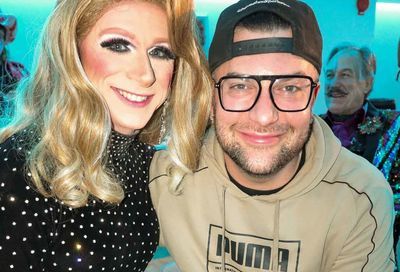New Blood
The band Vampire Weekend sounds a lot like Paul Simon if he were less stuffy and stricken with A.D.D.
What’s this: Another chart-topping, pop-culture act centered on vampires?
Well, no. Other than its name, the Brooklyn quartet Vampire Weekend has nothing to do with blood-sucking creatures of the night. Apparently, the name derives from an amateur film lead vocalist and guitarist Ezra Koenig once made.

Vampire Weekend
(Photo by Soren Solkaer Starbird)
Sounds suspicious, right? Given the uptick in unexplainable vampire fascination the past couple years, Koenig couldn’t have been more fortuitous in picking a name if he tried. And as if on cue, the blogosphere and music magazines swooned with such fervor – Spin called it ”The Year’s Best New Band” in 2007, even though its debut wasn’t released until January 2008 – by the time the world-beat rockers were ready to release Contra last week, a backlash was already salivating, ready to attack. But all the groundswell of support also meant that the new set got as much attention as if it had been released on a major-label, with a push as if the band were as big as Coldplay. And lo and behold, it debuted at No. 1 on Billboard‘s Hot 100 album chart.
What inspired the early and intense devotion, of course, is the band’s rich and delirious sound, unlike most others around. From its self-titled debut to Contra, Vampire Weekend has maintained a consistent sound, a melting pot combination of Afro-pop, British New Wave and even some Western classic music — what they self-describe as ”Upper West Side Soweto,” nodding to the quartet’s pedigree of meeting while students at Columbia University and loving the music from the famous South African township.
Ah yes, wealthy white kids appropriating musical traditions from the developing world. It’s easy to see why a vociferous backlash formed. And then you glance at the lyrics. Koenig sings of trust-fund babies on Contra‘s first single ”Cousins” as if he’s one of them: ”When your birthright is interest, you could just accrue it all.” On the gorgeous-sounding ”Run,” a rich couple discusses fleeing modern life for a humid paradise. ”She said, you know, there’s nowhere else to go,” he sings. ”But with her fund, it struck me that the two of us could run.”
A bigger gripe is that the band seemed to draw so much of its inspiration – and give so little recognition – to Paul Simon, whose influence is unmistakable to anyone with even a passing familiarity to Graceland. True, Koenig, multi-instrumentalist Rostam Batmanglij, drummer Chris Tomson and bass guitarist Chris Baio are all twenty-somethings who were only babies when Graceland was released in 1986. But surely they grew up listening to it, studying not only the dazzling musical cross-fertilization but also, with Koenig, Simon’s folksy vocal technique. Ultimately, Vampire Weekend sounds like Paul Simon if he were less stuffy and also stricken with A.D.D. It’s more playful, but also more jumbled.
Contra is a bolder set than its predecessor, with sharper lyrics and more adventurous music. But it also stumbles more noticeably. The album’s title is reportedly intended as a cheeky contrast to the 1980 album Sandinista! by punk legends The Clash. In late-’70s Nicaragua, the Contras were the right-wing militants established to oppose the left-wing Sandinistas. So what is the band trying to say here, that it’s right-wing? ”Never choose sides, never pick between two,” Koenig sings on closing track ”I Think You’re A Contra.” Sounds instead like they’re just being too clever by half.
You can barely make out the critical lyrics spoken in ”California English,” a song heavily accented by auto-tune, that annoying vocal trick of so much hip hop over the past year or so. Vampire Weekend is being ironic with its use of auto-tune here, which doesn’t help anything. It sounds like a grad-school project, an experiment for humor’s sake, not for music’s sake. The fact that Koenig and drummer Tomson first collaborated as members of a comedy-rap group belies that Vampire Weekend seems more focused on novelty and entertainment than on music.
Contra
XL Recordings
$14.98



The album launches with ”Horchata,” a track drunk with the charming sound of synthesized marimbas, as it lyrically references the milky, grain-based drink popular in various parts of Latin America, as well as other cross-cultural indulgences and exchanges. There’s some barbed critique in the lyrics, but you have to study to decipher them – and the music is so chipper and ornate, with even a short spell of a breezy techno jam, that you likely won’t even bother.
But it’s part of what keeps me from falling wholeheartedly in love with Vampire Weekend. Even after repeated listens, to the point when you anticipate a shift in tone or texture, and maybe even know the lyrics, it doesn’t pull you in on its own, or inspire you to sing along, or sing back after the fact. It’s the kind of eccentric music you appreciate, maybe even really like. But you study it more than savor it.
And you can only do that for so long.
Support Metro Weekly’s Journalism
These are challenging times for news organizations. And yet it’s crucial we stay active and provide vital resources and information to both our local readers and the world. So won’t you please take a moment and consider supporting Metro Weekly with a membership? For as little as $5 a month, you can help ensure Metro Weekly magazine and MetroWeekly.com remain free, viable resources as we provide the best, most diverse, culturally-resonant LGBTQ coverage in both the D.C. region and around the world. Memberships come with exclusive perks and discounts, your own personal digital delivery of each week’s magazine (and an archive), access to our Member's Lounge when it launches this fall, and exclusive members-only items like Metro Weekly Membership Mugs and Tote Bags! Check out all our membership levels here and please join us today!




















